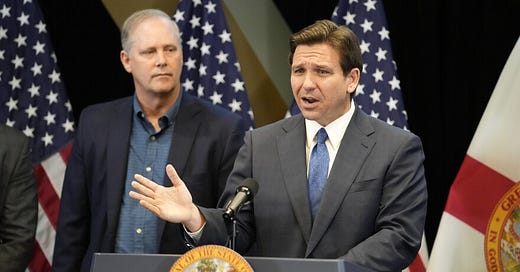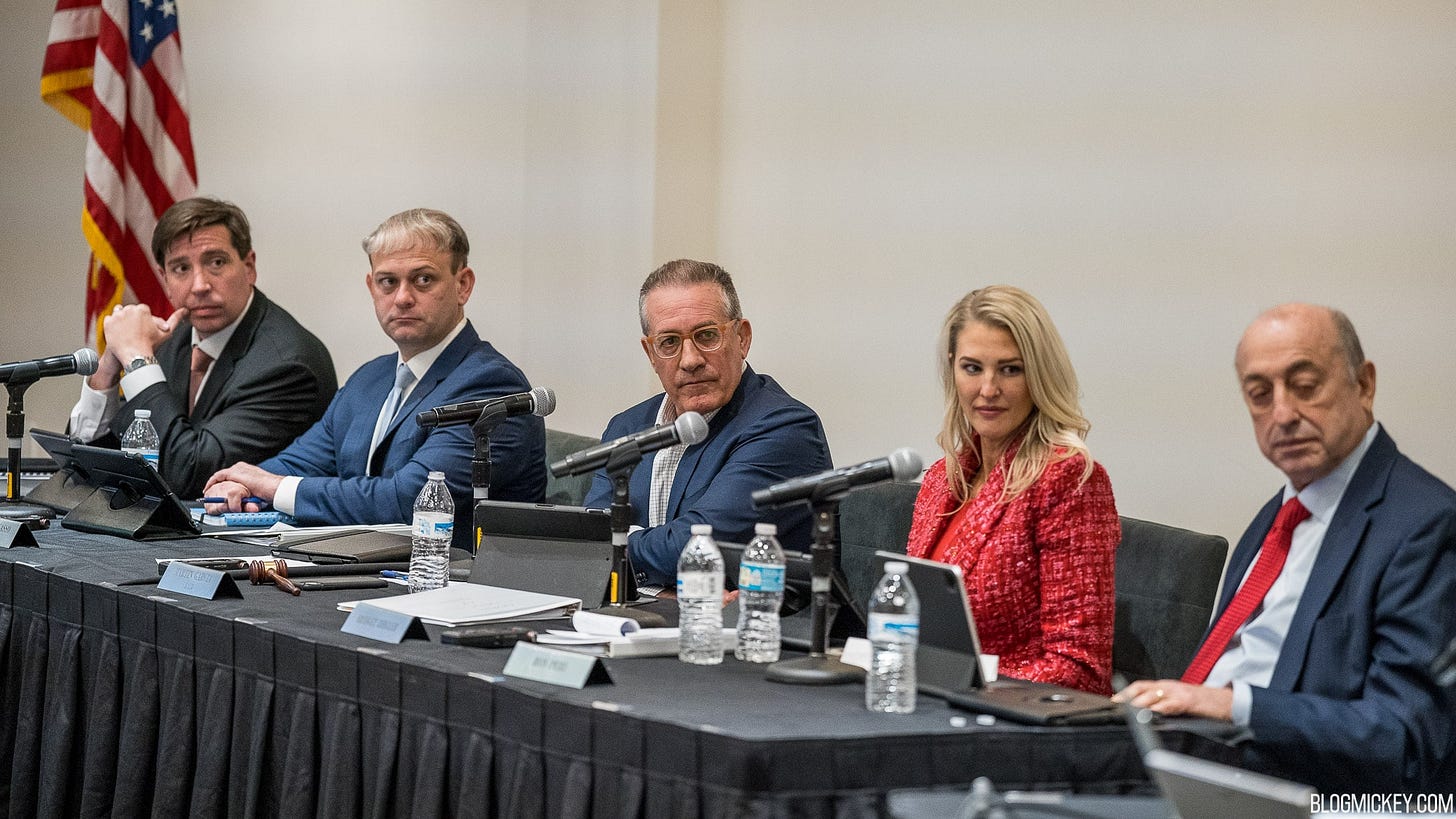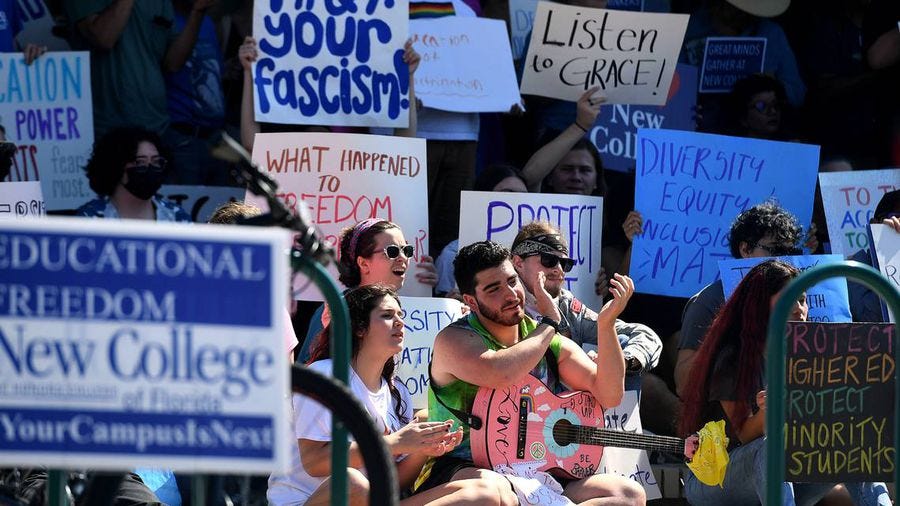Disney sues DeSantis, governor goes international, officials expand 'Don't Say Gay' law, and more...
April 28, 2023 — This Week's Top Stories in Florida
Welcome to this week’s edition of Floridian Today, a newsletter about all things Florida — from politics, business, real estate, and climate. Reporting from the Sunshine State, these are the most important stories you need to know. To never miss an update, subscribe here:
Here’s the latest from Florida…
Disney sues Gov. Ron DeSantis for retaliation, loss of special district privileges
The Walt Disney Company has filed a lawsuit against Governor Ron DeSantis, other state officials, and board members of the new Central Florida Tourism Oversight District, alleging that they had violated the company's First Amendment, contract rights, and due process rights by retaliating against it for speaking out against the Parental Rights in Education law last year, which critics have dubbed the "Don't Say Gay" bill. The lawsuit, which was filed Wednesday in a U.S. District Court for the Northern District of Florida, accuses DeSantis and others of waging a “targeted campaign of government retaliation" against Disney for its “protected speech.” The filing adds that the governor “now threatens Disney’s business operations, jeopardizes its economic future in the region, and violates its constitutional rights.” The legal action marks a significant escalation in the year-long feud between the entertainment giant and DeSantis, which was filed in court the same day that the governor’s handpicked special district oversight board voided a last-minute, friendly agreement between the former board and Disney. The company criticized board members’ termination of development contracts that would total more than $17 billion in investment and 13,000 new jobs over the next decade, characterizing their actions as "patently retaliatory, patently anti-business, and patently unconstitutional." The company said the DeSantis Administration, with support from lawmakers, has embarked on “a relentless campaign to weaponize government power against Disney in retaliation for expressing a political viewpoint unpopular with certain state officials.” The dispute will likely have significant political and economic implications for a company that is one of the state’s leading employers with 75,000 cast members and one of the largest taxpayers, paying more than $1.1 billion in state and local taxes in 2022.
Disney’s local business owners fear they will pay the price in DeSantis-Disney feud
On the same day that Disney sued Gov. DeSantis and the newly-created Central Florida Tourism Oversight Board convened to overturn an agreement made by the previous board that handed Disney significant autonomy, local business owners that run operations on Disney property and area residents spoke out on the ongoing quarrel. Speaking before the special district’s board, business owners called for the fight to cease and derided proposals by DeSantis and the oversight board members board to impose higher taxes on Disney. Other proposed punitive measures have included taxing hotels, adding tolls to roads within the district, increasing regulation for businesses, and stripping land away from the company for other purposes. Mark Gibson, the owner of Splitsville in Disney Springs, said the high-profile dispute has generated negative publicity that his employees have had to address with guests and customers. For these business owners, fears remain that forceful action by the state to penalize Disney will have unintended consequences on their business and employees. The owners of Disney Springs’ The Boathouse, T-Rex, Rainforest Cafe, and Yak & Yeti at Animal Kingdom explained at the meeting that retaliatory action could result in laying off employees or shuttering their operations altogether since they already pay millions in taxes and other fees as a tenant of Disney. Residents of Celebration, a town built by Disney that resides in the special taxing district, are concerned that the state could take away their homes or hike utility rates that the company provides via the Reedy Creek Improvement District (RCID).
Gov. DeSantis goes international
As Republican Gov. Ron DeSantis nears a likely entrance into the 2024 presidential election, he traveled to Japan, South Korea, Israel, and the United Kingdom as part of a four-nation trade mission that is an attempt to boost his diplomatic profile and foreign policy resume. The governor is meeting with foreign leaders and officials to discuss trade, investment, and tourism between Florida and the respective nations on his visit. The goal of the trip is aimed at positioning Florida as an economic leader and building mutually-beneficial foreign relationships to promote prosperity. The state is a major exporter of agricultural products and is home to a number of Fortune 500 companies that do business with the countries on the international tour. In Japan, DeSantis sat down with Japanese Prime Minister Fumio Kishida, Foreign Minister Yoshimasa Hayashi, and business leaders in Tokyo before jetting off to South Korea, where he met with South Korean Prime Minister Han Duck-soo. In Israel, Gov. DeSantis signed the “Public Nuisances” bill, after being recently passed by the Legislature, which makes it a felony for hate groups to harass people for their religion or ethnicity. DeSantis also met with Israeli Prime Minister Benjamin Netanyahu and delivered a keynote address at an event marking the 75th anniversary of Israel’s independence. He concluded his week-long trade mission in the U.K., where the governor met with British Foreign Secretary James Cleverly and Secretary of State for Business and Trade also serving as the U.K.’s President of the Board of Trade Kemi Badenoch. His overseas excursion is the first foreign trip he has made since 2019 when he previously traveled to Israel and held a ceremonial bill signing for a measure to combat anti-Semitism and religious discrimination. The trip is unusual for a sitting governor to make and is usually reserved for the U.S. president, U.S. Senators, members of Congress, or other federal officials. However, it points all the more to DeSantis’ vowing to take on Trump in a bid for the White House under the Republican nomination. Not only will this trip be an opportunity to raise his national (and international) status, but it will also be a test of his foreign policy skills and his ability to connect with overseas’ leaders that will weigh heavily as an evaluating critique in presidential politics. The trip was not paid for by Florida taxpayers and was funded by private donations through Enterprise Florida, the state’s private-public economic development organization.
'Don't Say Gay' law expanded to all public schools and grade levels
The Florida Board of Education has approved a rule that would expand Florida’s Parental Rights in Education law, which critics have dubbed “Don’t Say Gay” law, to all public schools through the 12th grade. The law – signed by Gov. Ron DeSantis last March – prohibits classroom instruction on sexual orientation or gender identity from kindergarten through third grade. The new rule expands the state administrative code to prohibit instruction on those topics in all grades unless required by state standards or as part of a health or physical education course. In those instances, a student’s parent has the option to withdraw their student from the lesson. The changes were approved unanimously by the Board. Teachers could face disciplinary actions such as being suspended, fired, or having their teaching certificates revoked if they ignore the ruling. Opponents of the recent administrative changes and the Parent Rights in Education law in general, say it is discriminatory and harmful to LGBTQ+ students while others contend that it violates the First Amendment rights of students and teachers.
Senate votes to shield DeSantis travel records and names of guests to governor’s mansion
Gov. DeSantis’ official travel records and the names of visitors to the governor’s mansion could soon be a secret under a controversial bill recently approved by the Senate in a 28-12 vote. SB 1616 creates a public records exemption for information held by law enforcement agencies related to “security or transportation services” provided to state officials and would apply retroactively to trips already taken. Protected officials from public disclosure of travel include the governor, the governor’s immediate family, the lieutenant governor, Cabinet members, the House speaker, the Senate president, the Florida Supreme Court chief justice, and other individuals requested by the governor or state leaders for security purposes. The bill would also prevent the disclosure of information related to security operations at the governor’s residence, including information about screenings and clearances of people visiting the mansion on non-government issues. Critics of the legislation say the new exemptions would make it easier for state officials to escape accountability, creates a “secretive government,” and obscures whether travel is funded with taxpayers’ dollars. The changes come as Gov. DeSantis has crisscrossed the nation – and now the globe – for months, engaging in book tour events and giving campaign-like speeches. The legislation travels next to the Florida House, where lawmakers are expected to approve it, before heading to the governor’s desk.
Resign-to-run? Not so fast.
GOP state lawmakers have cleared a potential roadblock to Gov. DeSantis’ entry into the presidential race by creating a special exemption to Florida’s resign-to-run law. The House and Senate passed an amendment to an elections bill that stipulates “any person seeking the office of the President or Vice President of the United States is not subject to the requirements of chapter 99,” which specify candidate qualifying requirements. The Legislature passed the amended bill along party lines in a swift fashion – less than one month after it was introduced. Once approved by the governor, the legislation will nullify existing law that requires elected officials to resign from their current seat before running for another office with an overlapping term. As it relates to DeSantis’ impending presidential bid, he would have to file a resignation letter ten days before the state’s presidential qualification deadline in December. However, the amended requirements only apply to an officeholder who seeks the U.S. presidency or vice presidency. This isn’t the first time the Legislature has come to the aid of the sitting governor when they eye higher office. Back in 2007, the Republican-controlled Legislature repealed the resign-to-run law to help then-Gov. Charlie Crist in case he became John McCain’s vice presidential running mate. The law was reinstated in 2018 when Gov. Rick Scott signed a bill that reversed the changes.
House passes bills targeting drag shows, transgender Floridians
Last week, the Florida House passed three separate bills on the same day that crack down on drag performances and restrict transgender equity and health care that opponents argue are “anti-LGBTQ+” and politically motivated. The GOP-controlled House approved legislation that censors drag shows, bans gender-affirming treatment for minors by forbidding hormone therapy and puberty blockers, and prevents transgender people from using bathroom facilities that correspond with their gender identity. Action taken by the Legislature highlights the strong focus lawmakers have had on LGBTQ rights following outcry by the DeSantis Administration and follows a national trend. Republican lawmakers have defended their actions when pushing for these changes by saying that they want to protect children and prevent them from being “indoctrinated.” The series of recent legislation includes a bill that bans minors from attending drag shows that came about after a December performance in Miami featured explicit content despite several children being in the audience. This drew the scorn of Gov. DeSantis, who vowed to take action against the “sexualized” displays, leading to SB 1438, which makes it a first-degree misdemeanor for an adult to take a minor to a drag show. This bill has already cleared the Senate and awaits the governor’s signature. Other measures approved include those that prevent minors from receiving sex-reassignment prescriptions or procedures and ban transgender men and women from using restrooms that do not align with their birth sex await a vote before the full Senate. All three bills are expected to become law by the time the annual Legislative Session concludes on May 5.
Lawmakers set to vote on bill blocking college DEI programs
The full House and Senate are set to vote on HB 999 and SB 266, respectively, that would prevent colleges and universities from spending on diversity, equity, and inclusion (DEI) programs. The programs, which are funded by the state's higher education budget, provide support for students from underrepresented groups by fostering a more inclusive and equitable learning environment. The language in the bills would restrict state or federal money from being used by schools to “promote, support, or maintain” any DEI programs or activities as well as limiting those funds from being used in political or social activism. DEI initiatives on college campuses can take many forms but typically focus on the following areas: recruitment and admissions to increase enrollment among minorities, curriculum and instruction to ensure it incorporates diverse perspectives and covers DEI-related issues, and campus climate to establish a welcoming environment by raising awareness and providing training on unconscious bias and microaggressions. The anticipated vote comes amid a national debate over race and equity in higher education in which Republicans and Democrats are at odds. Republicans have argued that the programs are unnecessary, operate under the guise of “social justice,” and that they promote discrimination against white students. Democrats have said that the programs are essential to promoting racial equity and ensuring that all students have an equal opportunity to succeed.
Data privacy bills go after big tech, head for final votes
Two bills that would give Floridians more control over their personal data are headed for final votes in the State Legislature. The bills, SB 262 and its companion HB 1547, would require companies to get permission from consumers before collecting or selling their personal data. They would also give consumers the right to access, delete, and correct their personal data, and to opt out of the sale of their data. This is in addition to imposing new disclosure requirements to give consumers transparency when their personal data is collected. The bills are expected to soon be voted on by the full House and Senate, where they are likely to be approved by lawmakers. But tech companies, who oppose the legislation, warn that the new requirement that compels search engines to disclose how they “prioritize or deprioritize” content based on political ideology is unconstitutional. The Senate’s version of the bill was amended to apply only to for-profit tech companies with over $1 billion in revenue that is derived largely from ad sales. This followed fears from small businesses that the new measures would reduce the advertising sales that allow them to compete if consumers were to opt out of online advertising. Consumer advocates praise the proposed legislation for giving users more control over their personal information and online footprint – information often sold to advertisers to sell targeted ads. The bills are part of a growing trend of states taking steps to protect consumer privacy such as California, Colorado, and Virginia.
Plaintiffs drop lawsuit against DeSantis’ migrant flights
Immigrant-advocacy groups have dropped a lawsuit filed against Gov. Ron DeSantis' administration following the flight of 49 migrants from Texas to Martha's Vineyard in Massachusetts last September. The Florida Immigrant Coalition, Americans for Immigrant Justice, and the Hope CommUnity Center filed a notice last week in a South Florida federal court to dismiss the case. The notice did not detail the reasons for the dismissal, but the lawsuit was now moot as lawmakers convened in February to pass a bill that repealed portions of the state budget that was used to fund the flights. The flights sparked national controversy as the Republican governor was accused of using the migrants as political pawns in a coordinated publicity stunt. The pro-immigrant groups that filed the lawsuit had argued that the flights were illegal and violated the migrants' rights as they also sought to block the state from using future funds to fly migrants to other states, as Gov. DeSantis has previously threatened. Since the lawsuit was filed in December, lawmakers have established the Unauthorized Alien Transport Program in state law that allocates $10 million to “facilitate the transport of unauthorized [migrants]” from the state.
DeSantis seeks federal aid for Fort Lauderdale following recent floods
On April 12 and 13, Fort Lauderdale was hit by heavy rains that caused widespread flooding to the surrounding area and damaged homes, businesses, and roads. Fort Lauderdale saw more than 25 inches of rain within 12 hours as neighboring cities in Broward County saw unprecedented levels of rainfall that overwhelmed stormwater systems. In response to the flooding, Gov. DeSantis is asking the Biden administration to declare Broward County a federal disaster area to aid local governments, businesses, and individuals in recovery. If granted, these entities and residents who incurred damage to their property would be eligible for financial loans and other forms of federal disaster assistance. In addition, the Florida Division of Emergency Management (FDEM) declared a state of emergency in Broward County and is providing financial assistance to those who have been affected. The Federal Emergency Management Agency (FEMA) is also assessing damage and providing assistance. Recent totals estimate the damage from the flooding in South Florida to be hundreds of millions of dollars.
Upcoming Events Across Florida:
May 3-7: Thunder Beach Spring Motorcycle Rally in Panama City Beach
The biannual event in Panama City Beach claims to be the “most biker-friendly motorcycle rally in the U.S.” with events at eight different venues. Nightly concerts at Frank Brown Park will be headlined by Rob Zombie on Thursday, Lynyrd Skynyrd on Friday, and Pantera on Saturday.
May 3-7: St. Augustine Food & Wine Festival
May 5-6: Tampa Riverfest at Curtis Hixon Park
Spanning along downtown Tampa’s Riverwalk and Curtis Hixon Park, the annual free Riverfest will host family-friendly activities, tribute bands, a water ski show, a hot air balloon glow at sunset, and attendees can decorate their own paper lanterns to take part in the 1-mile Lantern Parade.
May 5-7: SunFest in Downtown West Palm Beach
The two-day concert in downtown West Palm Beach will feature music performances by more than two dozen performers and bands, including The Chainsmokers, Flo Rida, Jack Johnson, The Killers, and Ziggy Marley. SunFest will also bring together 100 artists to display their work in the Art District, which will include demonstrations, immersive art installations, and innovative new products. Fireworks will conclude the festival on Sunday, May 7. General admission for a 1-day pass starts at $90.
May 5-7: Isle of Eight Flags Shrimp Festival in Fernandina Beach
The annual festival is a tribute to the eight different flags that have flown over Amelia Island and honors northeast Florida’s shrimp industry with thousands of pounds of fresh shrimp for hungry patrons. This year’s theme is “Shrimp Gone Wild” and favorite events include the 54th Topsy Smith Memorial Beard Contest, the 13th Annual Ice Cream Eating Contest, and the Shrimp Festival 5K Run/Walk.
May 5-7: Formula 1 Crypto.com Miami Grand Prix at Hard Rock Stadium in Miami Gardens
The highest class of international racing arrives to Miami Gardens, where the fastest regulated race cars in the world will traverse 3.36 miles of track on the grounds of Hard Rock Stadium. This year’s event will feature the new Team Village on the football field of the Miami Dolphins’ stadium over the three-day weekend, allowing ticket-holders to get a behind-the-scenes look at the racing action.
May 6-7: Indian River Marine Flea Market & Seafood Festival in Vero Beach
May 11-14: Fish to Fork in Amelia Island
May 13-14: St. Pete Tacos & Tequila Festival
Tacos, margaritas, and delectable treats will be served along the waterfront at St. Petersburg’s Vinoy Park. Dozens of food trucks and vendors will be offering both classic and unique Mexican-inspired cuisine as guests enjoy live music and dancing. Tickets start at $12.
May 13-14: Florida Outdoor Expo in Tampa
May 15-20: Florida Jeep Jam in Panama City Beach
One of the Southeast’s largest events for all things Jeep celebrates its 8th anniversary with a full schedule of activities, including off-road trail excursions, obstacle courses, a beach krawl, a Jeep-only parade, and numerous vendors.
May 18-21: Welcome to Rockville in Daytona Beach
Some of rock’s biggest names will descend on Daytona International Speedway in the return of the four-day outdoor music concert that includes performances by Slipknot, Rob Zombie, The Cult, Avenged Sevenfold, Evanscene, Pantera, Alice Cooper, Deftones, and dozens of other music performances. The event offers campground rentals and many on-site attractions. Single-day tickets for general admission begin at $129.99.
May 18-21: Thunder on Cocoa Beach
The offshore speedboat racing event brings added adrenaline to the Space Coast in four days of competition. Live entertainment, concerts, and block parties will follow each day of racing.
Thanks for reading this edition of Floridian Today. To never miss an update, subscribe for free:
In the meantime, if you learned something or found this read interesting, please consider sharing it to grow our community!











